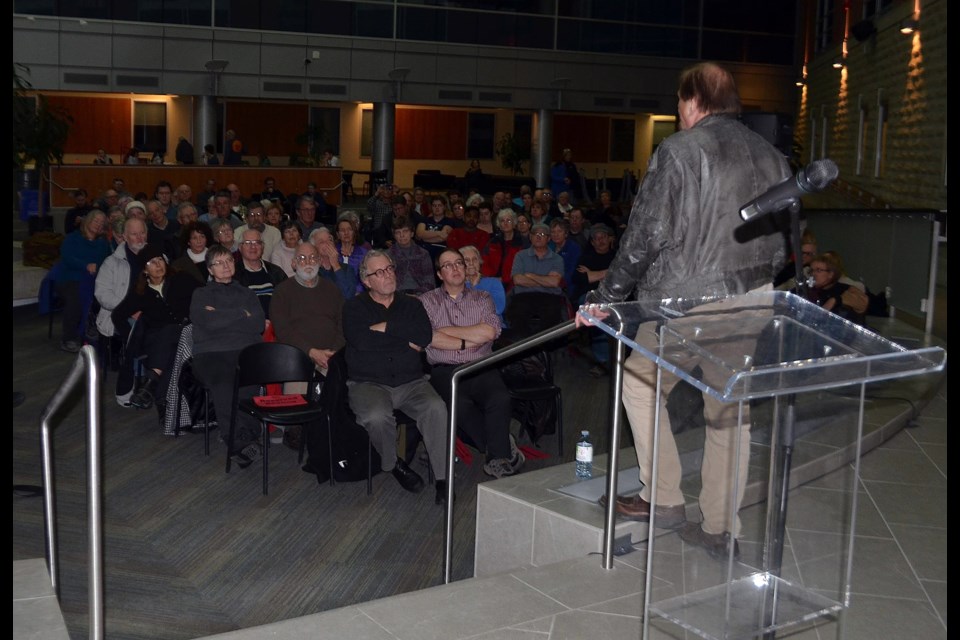“Don’t Panic! But You Can Worry a Little” was the title of a speech delivered by award-winning Canadian author, journalist and war historian Gwynne Dyer at the University of Guelph Tuesday evening.
“If historical ingratitude were a crime I think that the chattering classes of the West would all be in jail,” Dyer said. “We manage to take whatever crises we have and inflate them to fit the space available.”
Dyer spoke to a group of nearly 200 people in the atrium of the Science Complex during a free event organized by Vicki Isotamm from the College of Arts and ASTRA, the Arts, Science and Technology Research Alliance.
Most of the topics raised during the speech and discussed later during a question and answer session are examined in Dyer’s latest book Don’t Panic: ISIS, Terror and Today’s Middle East.
Dyer spoke about a number of crises facing the world today such as climate change, economic uncertainty in China, concerns about a new Cold War between Russia and the West and Islamic terrorism.
“I have heard both Stephen Harper and David Cameron refer to it (Islamic terrorism) exactly, as an existential threat,” said Dyer. “I don’t have to go to the dictionary to know an existential threat is a threat to one’s existence. I don’t think the existence of Canada is at risk here.”
Dyer said politicians aren’t the only people guilty of exaggerating the threat of terrorism.
“As a member of the media I am partially responsible because, as wise as I am, I write about it every time it happens as though it were important even if I say it is not,” he said. “I am still feeding the beast.”
Dyer said that even the worst case scenario that would see the government of Syria fall and Islamic State forces along with al Qaeda splinter group al Nusra taking over the whole country would have little impact on the security of Canada.
“We vastly overstate in our media the importance in the world of the Middle East,” he said. “It contains 10 per cent of the world’s population and in terms of the global economy the Middle East accounts for three per cent and I am including all the oil. I will be watching it and feeling terrible about it but pragmatically speaking it doesn’t matter all that much. Disasters that far away have no immediate impact.”
He said terrorist acts such as the attacks of September 11, 2001 are calculated efforts by Islamic terror groups to draw Western countries into invading Islamic countries and mobilizing revolutionary movements.
“Give them a bit of credit,” Dyer said. “They do have strategies. They are actually revolutionaries and terrorism is a strategy not an expression of emotion. Almost all modern revolutionary movements have resorted to terrorism at some point because the entry cost is very low. You don’t need heavy weapons or many people.”
It was, Dyer said, the United States’ over reaction to Islamic terrorism that led to many of the problems in the Middle East.
“The invasion of Iraq in 2003 was the exact opposite of elegant,” he said. “This is what Bin Laden hoped would happen and it did and there is now Islamic State.”
Dyer said he doesn’t want to downplay the genuine threats of terrorism in the region but there are much more serious threats to global security that aren’t getting the same attention or motivating the same mobilization of efforts.
One of those concerns is the economic and political stability of China.
“The current situation is that the regime no longer has a believable ideology,” Dyer said. “They don’t even believe it themselves. They remain in power because the goose is still laying the golden eggs. If the economic growth rate falls to one or two per cent then we will find out how the Chinese regime fairs when people who are otherwise not fond of it see that the goose is no longer laying the golden egg.”
Dyer said climate change remains the biggest threat to global security but he has some glimmers of hope following the climate summit in Paris in December 2015.
“Let me just say there is some reason to be more hopeful without getting carried away and being full of hope in the consequences of the Paris Conference,” Dyer said. “It ended up at the high end of expectation of what might be possible.”
He tried to end on a high note.
“On a scale of one to 10 and drawing on what we know of history, how good is the state of the present world compared to say 1914 or 1939, I would say it is about an eight. It’s not bad.”
